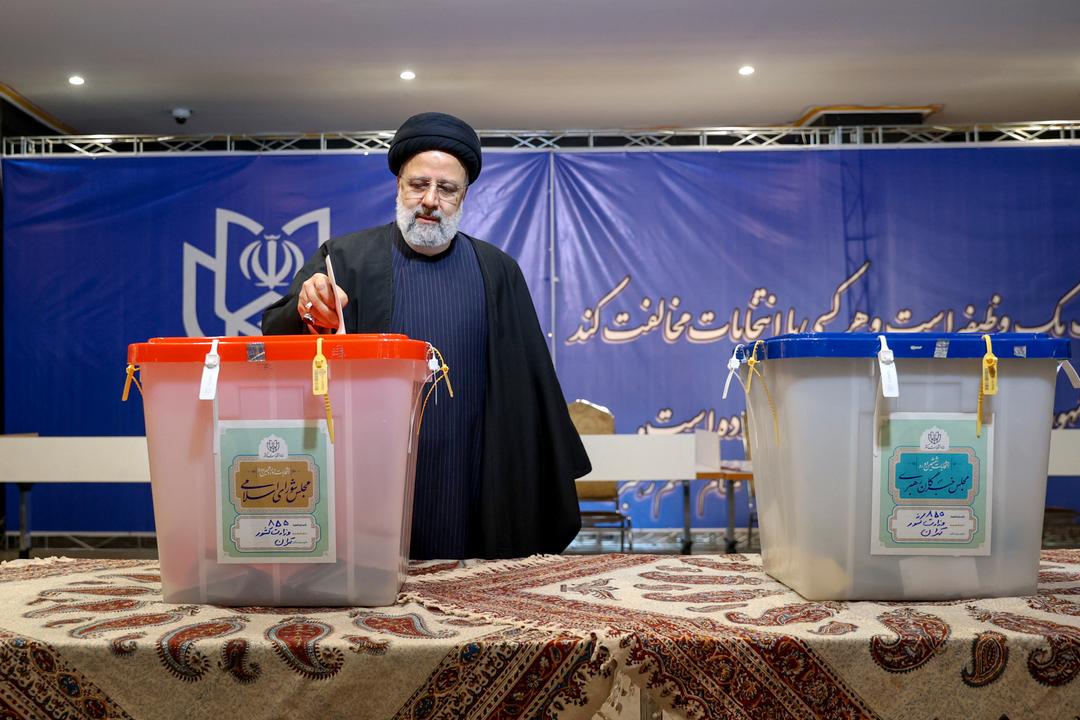Iran’s ultra-conservative President Ebrahim Raisi casts his vote in the election for a new National Assembly and Assembly of Experts on Friday. Photo: Iran’s presidential office via AP / NTB
A street musician plays for passers-by at the Grand Bazaar in Tehran the day after the election. Photo: Vahid Salemi / AP / NTB
A woman fills out her ballot in a polling station in Tehran on Friday. Photo: Vahid Salemi / AP / NTB
Iranian women continue to defy authorities’ orders to cover their hair, here at the mosque in Tehran’s Old Bazaar the day after election day. Only one in four eligible voters cast a ballot in the capital, according to local media. Photo: Vahid Salemi / AP / NTB
The “Women, Life, Freedom” protests began in 2022 and became the largest protests in the country since the establishment of the Islamic Republic of Iran in 1979. Although the open protests have died down, it is still simmering under the surface. Here, a woman defies the hijab order in Tehran the day after the election. Photo: Vahid Salemi / AP / NTB
A newlywed couple arrives at a polling station to cast their vote in Tehran on Friday in the first election since the mass protests that broke out in September 2022. Photo: Vahid Salemi / AP / NTB
Conservative candidates walked away with the victory in the elections in Iran, Iranian media reports. Voter turnout may have reached a new low.
Sunday 3 March at 22:25
– The soul of the election was lost, notes the reform-friendly newspaper Ham Mihan after the first election in Iran since the mass protests in the wake of Mahsa Amini’s death in September 2022.
The 22-year-old died after she was arrested for allegedly defying the regime’s strict dress code for women.
Counting continued on Sunday after Friday’s election for a new national assembly and expert assembly. The latter advises Iran’s supreme leader and chooses his successor when he dies.
Lower attendance than during the pandemic
The state news agency IRNA estimates that turnout ended at around 41 percent among the 61 million eligible voters. It is lower than during the previous parliamentary election, which was held during the corona pandemic in 2020.
This year’s elections were held while many Iranians are suffering from a deep economic crisis that has been exacerbated by international sanctions.
– The next parliament will be in the hands of radical conservatives who took advantage of the opportunities created by low participation, writes the reform-friendly newspaper Shargh.
Facts about Iran’s political system
- Constitutional Islamic Republic, built on the principle that the state should be governed by Islamic scribes.
- Political power is divided between elected authorities and Islamic theologians in various bodies, as well as the military – primarily the Revolutionary Guard.
- The Supreme Leader and the Guardian Council have the final say.
- The assembly of experts appoints the supreme leader, since 1989 Ayatollah Ali Khamenei (84). He is head of state, religious leader and commander-in-chief of the armed forces. He controls the judiciary, defense, security and intelligence agencies and the media.
- The president is head of government and has supreme executive power – but less power than Khamenei.
- Legislative power has been added to the parliament with 290 elected representatives. Parliament drafts laws, ratifies international agreements and approves the national budget.
- The president and parliament are elected in general elections for four years.
- The Guardian Council consists of six clerics appointed by Khamenei and six jurists appointed by the National Assembly on the proposal of the head of the judiciary. All candidates standing for election must be approved by the council, which also supervises the elections themselves.
- The elected representatives’ decisions must also be approved by the Guardian Council, which has at times scrapped 40 per cent of adopted laws.
- The Assembly of Experts supervises the Supreme Leader, has the power to remove him and appoints his successor. The body is elected by the people, but the candidates for the Expert Council must also be approved by the Guardian Council.
(Sources: NTB, Great Norwegian Lexicon, Britannica, PBS)
Sea view
Blank voices
Another pro-reform newspaper, Etemad, reports that voter turnout was lower in Iran’s big cities, and that there was a significant number who voted blankly.
In the capital Tehran, turnout was only 25 percent, according to Iranian media. They report that ultra-conservative candidates won as many as 12 of the 30 parliamentary seats from the capital.
The low voter turnout could have political consequences for Iran’s system, according to Ham Mihan. The pro-government newspaper Iran Daily says the authorities should regard the low turnout as a scare.
– They must step up their efforts to strengthen their voter base, writes the newspaper.
Many banned
Conservative and ultra-conservative actors will end up as the election’s biggest winners, states the political analyst Mohammed Mohajeri.
This year too, potential candidates had to go through an approval process which led to many being banned. Nevertheless, a record high number of candidates – 15,200 – stood for election in the 290 seats in the National Assembly. Among them were 1,700 women.
By allowing so many to run, the authorities wanted to facilitate “local competition and increase participation”, according to journalist Maziar Khoshravi.
Reform-friendly boycott
144 candidates stood for election to the 88 members of the new assembly of experts, which is reserved for scribe Shia Muslim priests. Former president Hassan Rouhani was barred from running for re-election in the assembly he has been a member of for 24 years.
Rouhani, who is considered a moderate, nevertheless cast his vote in the election on Friday. Another former president, reform-friendly Mohammed Khatami, did not do that, says the opposition party coalition, which calls itself the Reform Front.
Iran is “very far from free and competitive elections”, Khatami stated on his website in February.
2024-03-03 21:24:25
#Media #Ultraconservatives #win #election #Iran


